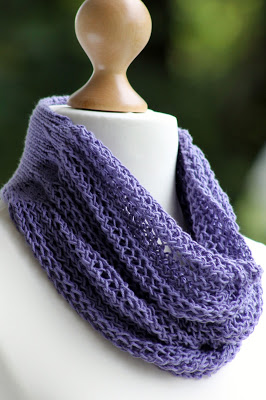Crochet Your Own Allergy-Friendly Cowl







As I promised to prepare posts due to your wishes, I do my best to find the tutorials for you.
One lady asked me to find something without animal yarn, as she is allergic to it. Here is an example of a cowl, knitted from partly acrylic, partly cotton yarn.
Materials Required
Yarn: Premier Yarns Cotton Fair (52% Cotton, 48% Acrylic; 317 yards [290 meters]/100 grams); #27-09 Lavender - one skein
Needles: Straight needles in size US 3, straight needles in size US 4, straight needles in size US 8, and straight needles in size US 5 for provisional cast-on
Notions: Tapestry needle
Gauge: 23 stitches = 4 inches in stockinette on size US 4 needles
Knitting Instructions
So let's make a cowl! Using your size 5 needles and a length of scrap yarn, cast on 35 stitches provisionally. Transfer work to your size 4 needles and knit two transition rows, as follows:
Transition Rows
Transition Row 1 (wrong side): purl
Transition Row 2: knit
Knit these two transition rows, and then transfer work to your size 3 needles, and we'll work a ribbing for a bit, like so:
Ribbing
Ribbing Row 1 (wrong side): p1, * k1, p1; rep from * until you reach the end of the row
Ribbing Row 2: k1, * p1, k1 *
Knit ribbing rows 1 & 2 until the piece measures roughly 7.5" and you've just finished a right-side row. Transfer work back to your size US 4 needles. Then we'll work a few more transition rows, as follows:
Additional Transition Rows
You'll need the following notation to continue:
Lifted Increase (li): Insert right-hand needle straight through the middle of the next stitch in the row below, and knit; then knit the stitch on your needle normally.
And once you're clear on that, continue like so:
Transition Row 1 (wrong side): purl
Transition Row 2: knit
Transition Row 3: purl
Transition Row 4: knit
Transition Row 5: purl
Transition Row 6: * li * (70 stitches)
Transition Row 7: purl
Work transition rows 1 - 7. Transfer work to your size US 8 needles, and then we'll begin the main pattern, which is Rick Rib from page 260 of Barbara G. Walker's A Second Treasury of Knitting Patterns, and goes like so:
Main Pattern
Row 1 (right side): k1, * yo, slip 1 stitch purlwise with yarn in back, k1, pass slipped stitch over (psso); rep from *; end k1
Row 2: p1, * yo, slip 1 stitch purlwise with yarn in front, p1, psso; rep from *; end p1
Knit rows 1 & 2 until the piece measures roughly 24" (of course you can also make it longer), and you've just finished a right-side row. Transfer work back to your size 4 needles. Then we'll work some final transition rows, which you'll find below:
Final Transition Rows
Transition Row 1 (wrong side): purl
Transition Row 2: * k2tog * (35 stitches)
Transition Row 3: purl
Transition Row 4: knit
Knit transition rows 1 - 4. Leave working stitches on one needle, and then transfer your provisional cast-on stitches back to your other size 4 needle. Using the Kitchener stitch, graft. Tuck in ends, and, if desired, block.



